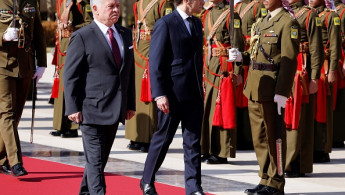Countries pledge to support Iraq's 'stability' at Jordan summit
Leaders from the Middle East and beyond pledged Tuesday to support Iraq's "stability" and called for Baghdad to distance itself from foreign influence, at a summit aimed at helping resolve regional crises.
Iraq has been caught for years in a delicate balancing act between its two main allies, the United States and Iran, and Baghdad only recently arrived at a fragile compromise government after a year of political stalemate.
The "Baghdad II" meeting in Jordan, which also included officials from France and the European Union, followed an August 2021 summit in Iraq's capital organised at the initiative of French President Emmanuel Macron.
Paris has taken an increasingly active role in the region in recent years, with President Emmanuel Macron also attempting to intervene to resolve the political crisis in Lebanon.
Speaking at Tuesday's conference, Macron said France is attached to the stability of the region, which he said is struggling with “deadlocks, divisions, foreign meddling and security issues” in the interests of promoting peace and security in the broader Mediterranean basin.
“Iraq probably is, given the past decades, one of the main victims of regional destabilization,” Macron said. “We need to be able to....overcome the divisions of the moment.”
Summit participants said they would continue to "cooperate with Iraq to support its stability, sovereignty and the democratic process in the country", a final statement read.
They also vowed to support "Iraq's efforts to establish dialogue as a way of resolving regional crises".
The conference was a test for Iraq's new Prime Minister Mohammed Shia al-Sudani, considered closer to Iran than his predecessor, and who was appointed in October after more than a year of political deadlock.
Sudani committed to "balanced relations with all regional and international partners".
Jordan’s King Abdullah II said in his opening remarks that the meeting “takes place at a time when the region is facing security and political crises,” along with threats to food, water, health and energy security and the impacts of climate change.





 Follow the Middle East's top stories in English at The New Arab on Google News
Follow the Middle East's top stories in English at The New Arab on Google News


